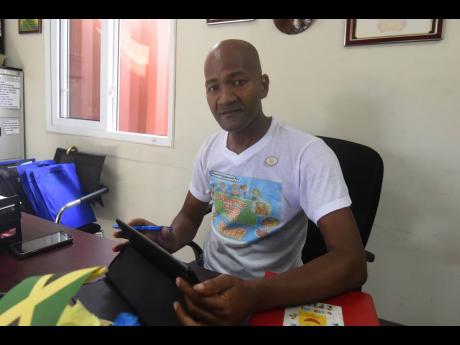Linstead CDC, partners assist with online learning
The issue of Internet and Wi-Fi connectivity for students who have to do online classes in some rural St Catherine communities has been a challenge since the onset of the coronavirus in Jamaica that forced the discontinuation of face-to-face classes.
Recognising this problem, the Linstead Community Development Committee (CDC) has initiated a programme to help disadvantaged students to be able to fully participate in online classes.
For the past year, the CDC has partnered with other stakeholders and has afforded online access to some 25 students drawn from six primary and five high schools in around the Linstead area in space provided at the CDC office in Linstead, where all the COVID-19 protocols are observed.
“We found out that not all the students had Internet connection or even the devices to facilitate online classes. We also discovered that not all the schools were dropping off work material for these students, so they were at a disadvantage,” Devon Smith, president of the Linstead CDC, told The Gleaner.
“Realising these difficulties, and coupled with the fact that the CDC was celebrating the Year of the Youth, we had to act so we established a Zoom platform to facilitate these students,” Smith noted.
He revealed that the CDC reached out to other organisations such as the Optimist and Rotary clubs and community-based stakeholders to partner with the group to provide a total package for these students.
“So we got these stakeholders together, we were given devices, we got Internet service from a local provider, and lunches supplied by local restaurants, and we brought the students in the space under strict supervision to ensure that they are participating in classes.”
Smith said the programme runs from Monday to Friday from 8 a.m. to 3:30 p.m., with students who have homework given the access to remain behind to complete their assignments with help from CDC volunteers.
“We were very nervous, however, of those grade six students sitting the PEP, so special provisions were made for them. We can declare that they all passed for traditional high schools and we are happy for this,” Smith said.
Success story
Twelve-year-old Andreio Walters, who started using the facility in October 2020, is one of the success stories.
A former student of Ewarton Primary School, he and his brother were having difficulties obtaining devices and Internet connection at their home because their parents could not afford it, so they joined the programme.
Both boys now attend the Dinthill Technical High School after their performance in the Primary Exit Profile examinations.
“I was happy when I found out about this place, it helped me to do my classes so that I could pass for Dinthill,” Walters, who was working from his tablet, told The Gleaner.
He said not being able to attend school for face-to-face learning, the Zoom platform provided by the CDC is helping him and the other students to participate in schoolwork.
The issue of connectivity for students in some rural communities has been the subject of much concern to the Government, according to Education Minister Fayval Williams.
The minister told The Gleaner recently that the Government will soon roll out a solution to this problem.

